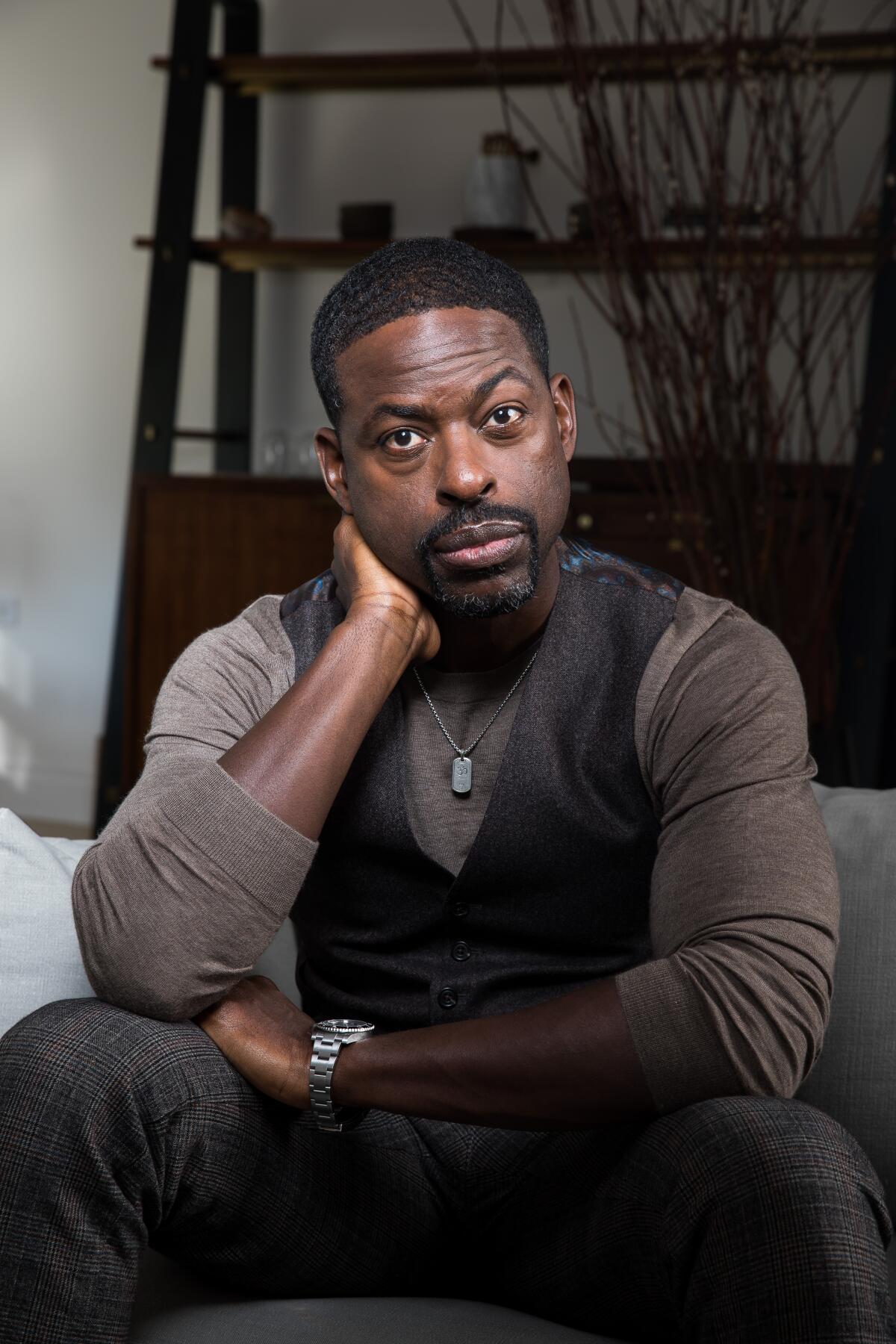How Sterling K. Brown told his mom he was leaving economics for an acting career

- Share via
New York — Sterling K. Brown is late to his interview but he’s got a good excuse: After a screening of his new film “Waves” for a group of students, he stayed to speak with the kids. Being Mr. Popular is a nice place for Brown to find himself in; after a 20-year acting career he finally broke big three years ago with Emmy wins for “American Crime Story” and “This Is Us.”
Now he’s got his own production company (Indian Meadows) and has roles in “Frozen 2,” “The Marvelous Mrs. Maisel” and “Waves.” He sat with The Envelope to talk about success, identity and fatherhood.
The last few years have been a real whirlwind for you; what’s it been like inside that storm?
Like my man Lin-Manuel [Miranda] said, in the eye of the hurricane there’s quiet. You’re constantly trying to find your way into the eye. It feels like a whirlwind, but it’s also a fortunate place to be.
That said, it’s been a long way to your overnight success. You graduated from Stanford in 1998 with an acting degree, then got an MFA from New York University’s Tisch School. How did you keep plugging forward when the gigs were smallish and the paychecks smaller?
It’s a marathon and not a sprint. Sometimes you have to feed your family, and sometimes you have to feed your soul — and those two things did not overlap for the majority of my career. If you want health insurance, you take guest spots. Then you do a play to make sure your muscles aren’t atrophying — and it may not pay all your bills.
Most folks don’t attend Stanford for the acting program; you went for economics and shifted. How did you break that to your mom?
I’d been wrestling with it for a while. I didn’t think it was a prudent future to pursue; I didn’t think I’d be able to make a contribution to my family. But life was better when I was on the stage. I called my mom and said, “I’m thinking of changing my major,” and she said, “Did you pray on it?” And I said I had, so she said, “Go with God, do your thing.” I’ve never had less than 110% support from her ever since.
In “Waves,” Ronald gives his son a speech about having to be better than the rest of his schoolmates. He never says “because you are a young black man,” but it’s clearly implied. Does that echo your experience?
I was raised very much the same way; you’re told you’ve got to be 10 times as good to get as far because your starting line is so different. People are looking for ways for you to fail, to dehumanize you — so you work extra hard. That’s a message that was passed on to me by my mother and father and uncles and aunts. What he learns after the [film’s] tragedy is there’s more than one way to be strong.
Many characters you’ve played have been thoughtful and morally centered people, if flawed. Is that a throughline you’ve sought out as an actor?
Well, in “Predator” I was playing kind of a douchebag, but I’m honored to be presented with roles that reflect some kind of moral consciousness. It’s not important that every role I play be a “good guy”; there’s undue pressure when people see in media people that are too good to be true. And sometimes I just do things I think will be fun for my family. One reason to do “Frozen 2” is I was thinking it was time to do something my kids [with actress Ryan Michelle Bathe] would enjoy.
Do you ever make role choices based on believing there needs to be more black male role models in film and TV?
It matters. I have to have some eye toward what I’m representing for my community. It gives me joy when the black community in particular sees my roles and says, “Keep doing what you’re doing, brother. People are looking up to you.” And I hope that gives me latitude when I do something they don’t like.
You lost your own father when you were 10, and now you’re playing fathers on screen. How does he come to mind as you create those characters?
My dad is neither Ronald nor [“This Is Us’”] Randall. I think of my dad mostly as me. He didn’t have a formal education that went beyond high school, but he knew how to take the temperature of a room before he opened his mouth. The way he loved me is the way I try to love my children. You fall asleep in the back seat of the car just so your dad can pick you up and carry you into the house. Part of the reason I work out as much as I do is so I can pick up my children and carry them as long as possible.
More to Read
Only good movies
Get the Indie Focus newsletter, Mark Olsen's weekly guide to the world of cinema.
You may occasionally receive promotional content from the Los Angeles Times.










